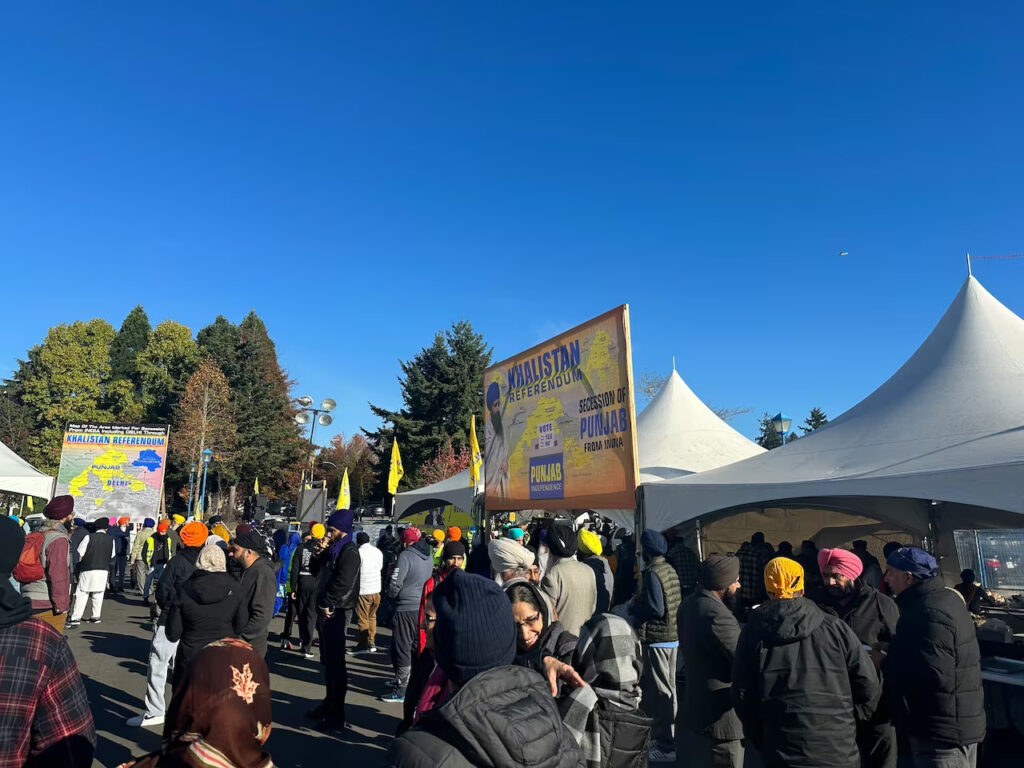Unofficial referendum has been touring Sikh diasporas around the world; result would not be binding in India Tens of thousands of Sikhs turned out in Surrey, B.C., on Sunday, organizers and observers said, for another chance to vote in an unofficial referendum on the creation of an independent Sikh state.
It was the second round of the referendum in British Columbia, after U.S.-based organizing group Sikhs for Justice said the first ballot on Sept. 10 was so popular that voting couldn’t be completed in one day. Sunday’s vote on Khalistan — an independent state in India’s Punjab region proposed by some Sikhs — took place at the same gurdwara where activist Hardeep Singh Nijjar was shot dead in June.
Prime Minister Justin Trudeau’s claim on Sept. 18 that there were “credible allegations” linking India’s government to Nijjar’s killing — a claim strongly denied by India — has caused political tension between the two countries. Sarbraj Kahlon, news director at Radio Punjab, who was at the referendum site Sunday, said 65,700 people turned out to cast ballots. Voters were required to be Sikh and over 18 years old.
Organizers said more than 200,000 people cast ballots over the two days of voting, with Sikhs for Justice estimating 135,000 people voted in September. CBC News has been unable to verify the turnout numbers. Approximately 290,000 Sikhs live in B.C., according to the 2021 census.
“The vast majority of people voted in the last referendum, but those who didn’t have the opportunity to vote in that one are having a second shot at having their voices heard democratically and peacefully,” Jatinder Singh Grewal, a B.C. director with Sikhs for Justice, said from outside the polls on Sunday.
“People are coming out and it’s a beautiful thing.”
Voters on Sunday appeared to skew older than those who turned out in September. Loud chants of “Khalistan” could be heard over loudspeakers, and many flags in support of the state’s creation were seen as people queued to cast their ballots.
Officers from the Surrey Police Service and Surrey RCMP were also positioned around the location. Kahlon, with Radio Punjab, said the number of voters picked up as the day progressed and temperatures warmed.
“In the morning the turnout was a bit low but now as we reach another phase of the day, there is a large turnout,” he said.
India allegations stirring voters, says organizer
Voters came from all over B.C. to have their say on Sunday, said Grewal, who added that many were motivated by the prime minister’s claims about Nijjar’s killing.
“It’s made them realize we do need to be an independent country, we need to protect our interests,” said Grewal. “The passion, the desire for having people’s voices heard is still there.”
The Indian government has denied involvement in Nijjar’s death, calling Trudeau’s claims “absurd.” Nijjar was an organizer of the Khalistan referendum in Canada, and India had named him a terrorist before he died, an allegation he denied.
The Indian government has long maintained that the Punjabi independence movement undermines India’s national security and declared Sikhs for Justice a banned group in 2019.
Vote results expected in 2025: organizers
The vote has been touring to Sikh diasporas around the world since 2021, with stops in cities including London, Rome and Melbourne, Australia. In Ontario, the poll drew thousands of people in Brampton last year, and thousands in Mississauga in July.
The group’s ultimate goal is to hold a vote in Punjab in 2025, though it would not be legally binding in India. Grewal says if the results show support for Khalistan, it would provide strong grounds for the group to advocate to the United Nations and other international bodies.
More voting locations are expected to be added next year — including Abbotsford, B.C., Calgary, Edmonton and Montreal — and results of the vote would be announced in 2025, Gurpatwant Singh Pannun with Sikhs for Justice told CBC News early Monday.
He said up to 30 per cent of voters in B.C. came to Surrey from other locations such as Calgary, Edmonton or U.S. cities. International students voted in significant numbers, he added. The project is being overseen by the Punjab Referendum Commission, which describes itself as a group of independent, non-aligned direct democracy and political experts.
Commission chairman Dane Waters, a political strategist who has worked on several U.S. presidential campaigns, says it’s significant that the Sikh diaspora is able to participate in the movement from abroad.
“It gives them a voice,” he said in Surrey on Sunday. “What you’re seeing around the world is a lot of violence, and for those of us who believe in referendums, it’s a nonviolent solution to very volatile situations.”
Waters says Canada’s allegations have certainly affected people’s decisions to voice their opinion on Khalistan amid heightened concerns from Sikhs about their own safety.
“It works both ways,” he said. “Some people are now more motivated to vote because they are showing they will not be stopped, and there are some who aren’t voting because of that.”
Source: CBC News


